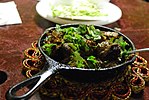Hunza diet
 |
| This article is part of the series |
| Pakistani cuisine پاکستانی پکوان |
|---|
The Hunza diet consists of a series of selective food and drink intake practiced by the Hunza people of northern Pakistan that is argued by some to be unique and have long lasting effects.[1][2] The diet mostly consists of raw food including nuts, fruits and seeds added with yogurt. The cooked meal, daal included with chappati, is included for dinner. It has also been advocated for being inexpensive and mostly self-producible.[3]
Proponents
The Irish physician Robert McCarrison is believed to have traveled to this area during the days of the British Raj and tested this diet on rats in England. The results are claimed to have given the rats longer lasting lives.[4] In his book about the Hunza, Jay Hoffman argued that by the ratio to cats, dogs and horses, humans should live up to 120 to 150 years and argues the Hunza diet to be the key to this longevity.[5] [6]
See also
References
- ^ Collins, Danica. "You Are What You Eat…Hunza Diet Provides Longevity and Happiness - Underground Health Reporter". undergroundhealthreporter.com.
- ^ "The Hunza Diet". mcvitamins.com.
- ^ Johnston, Rae. "12 Diets In 12 Months: The Hunza Diet".
- ^ Janet Luhrs (1997). The Simple Living Guide: A Sourcebook for Less Stressful, More Joyful Living. Broadway Books. p. 273. ISBN 978-0-553-06796-5.
- ^ Jay M. Hoffman. Hunza: Secrets of the World's Healthiest and Oldest Living People. New Win Pub, 1997. ISBN 0832905135.
- ^ Keto Advanced Review
External links
- The Truth, Myths, and Lies About the Health and Diet of the "Long-Lived" People of Hunza, Pakistan, and Hunza Bread and Pie Recipes
- You are what you eat – Hunza diet for long lifetime and happiness
- Health Secrets Of The Hunzas Donald G. Garty, personal coach
- Health Secrets Of The Hunzas Christian H. Godefroy
- Hunza Bread Travel & culture
- Authentic Hunza bread Cookingclinic
